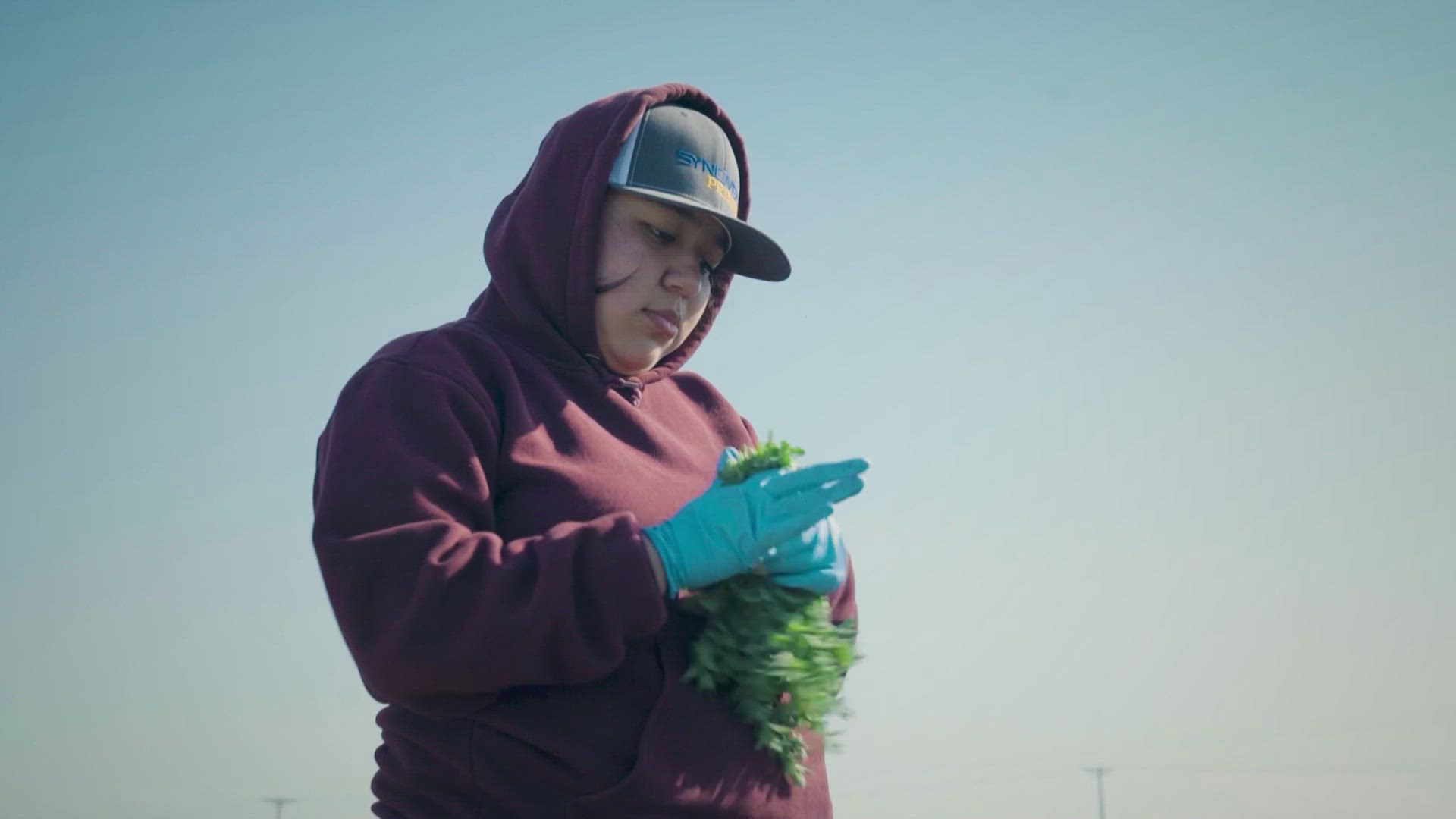ELTOPIA, Wash. — Farmers in Eastern Washington are bracing for impact from President Donald Trump's immigration policies. They worry the state's multi-billion-dollar agriculture industry will collapse under the promise of mass deportations.
KING 5's Facing Race team traveled to Eastern Washington for their series, 'Harvest Under Pressure.'
15 miles north of Pasco it's peak asparagus season at Alan Schreiber's farm.
"We grow 350 different kinds of crops and varieties," Schreiber said. He explained that his kind of farm is called a diversified farm, one that doesn't focus on just one or two crops.
Each spear of asparagus is hand-picked and hand-packed. The work is done daily, mostly by immigrant workers who came to America, dreaming of opportunities.
Harvesting produce that is on the ground level is especially difficult, as it involves being hunched over for hours. Which is why Schreiber said U.S. citizens usually don't fill those farm working positions.
"The work is hard, it's too cold, it's too hot, too windy, too dusty, too dirty," Schreiber said. "There's simply better jobs for people who are U.S. citizens to get."
Recently, Schreiber said workers are harder to find.
"It always used to be no problem-- we would be turning away farm workers, but that's less and less the case now," he said.
The hands that feed America
Since President Trump took office, the rhetoric of mass deportations has deeply shaken up the farm worker community. According to the American Immigration Council, immigrants make up 77% of miscellaneous agricultural workers in the state. Of the immigrant population, 21.6% are undocumented.
"I have not seen such a scared workforce," Schreiber said. "I mean, they're scared."
Schreiber said all of his workers are documented. For employment, he asks for a driver's license and a social security card.
"But we know that in this population, a lot of farm workers in the state of Washington and across the country are not documented," he said. "We can't lose these workers. If we had perfect enforcement of federal immigration rules, we'd starve in this country."
Dr. Jacob Vigdor is a professor of public policy and governance at the University of Washington.
"Here in the Western United States, we have relied on immigrant labor to do a lot of the agricultural work since the 1940s," Vigdor said. "If we can no longer bring workers here to harvest food in the United States, then we're looking at a future where we're just going to be importing even more of our food. It will mean higher prices, it will mean that some things won't be available in the grocery stores in the way we've become accustomed to."
Vigdor said legal channels of employment like seasonal H-2A visas have always been an option, but they can be complicated, and are often unpopular among employers. Several farmers and industry leaders have expressed that the H-2A visas are also expensive to apply for and maintain, making it unsustainable for small and medium-sized farms.
Washington's agriculture industry is roughly 12% of the overall state economy. It brings in $10.6 billion in revenue each year, and produces 164,000 jobs, according to the Washington Farm Bureau. Without Washington's ag industry, America would lose its 3rd largest food exporter.
'They just don't understand'
Back at Schreiber Farms, Nancy said she takes pride in being a small slice of the big industry.
"Just to help out the community, so they can have something in stores," Nancy said, when asked why she works.
News about ICE arrests has shaken her up too, even though she was born in the U.S.
"I'm not stealing, doing anything to hurt people," she responded when asked if she fears living her life. "But I still get scared and just decide to stay home."
But staying home doesn't pay the bills.
"We're just working to get money to support our families that we have, so they can have food on the table and we can have money to pay all the costs we have," she said.
Enocencio does the same. The money he earns cutting asparagus on Schreiber Farms, he sends to family back home in Vera Cruz, Mexico.
"For them, there is a better opportunity to live over there in my hometown, and I work here," he said through an interpreter. "And the little that I earn here, I send to them. And I also have my expenses."
As for fear? He shook his head.
"I'm not worried," he added. "I come and do my job. I'm not hurting anyone, I'm with family."
For Alan Schreiber, who has been farming in Eltopia for nearly three decades, taking care of his produce means taking care of his people.
"I am closer to that family than I am my own biological family that's still in the farm in Missouri," he said. He added that he wishes the people who make the laws would think twice about the hands that feed America.
"Whoever is pushing a 'deport them all,' just doesn't really understand what is going on out here in the fields, in the packing sheds and in the processing plants," Schreiber said. "They just don't understand."

